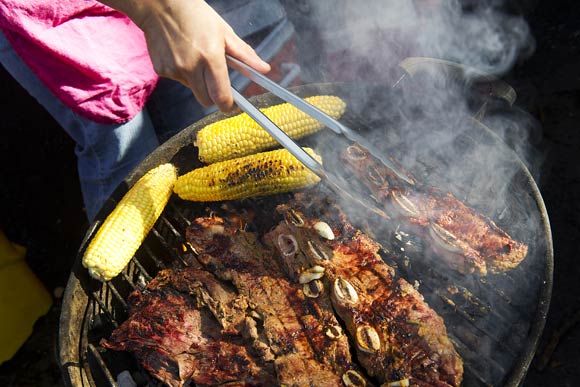From her one-acre yard in Adelphi, Rosa Linares grows enough vegetables to fill a small stand at the Crossroads Farmers Market every Wednesday. And, with a little more help, she'd like to sell her way out of poverty — by making tamales.
Linares is one of three women at this market alone that a new commercial kitchen will help once it’s completed next year by a coalition of local partners, including the
Crossroads Community Food Network that hosts market in Takoma Park.
Housed at the Takoma Park Presbyterian Church, the
new kitchen will offer food preparation space along with micro-enterprise development and classes about cooking and nutrition for low-income residents.
Supporters recently raised the nearly $400,000 (partially through an
Indiegogo campaign) needed to renovate the donated kitchen space and bring it up to health code.
Christie Balch, executive director of the Crossroads nonprofit, says groups are still raising funds to operate the kitchen and its programs once it opens next year.
But the kitchen shouldn’t have a problem finding demand for its space.
Nancia Sical wrote in a letter to the kitchen organizers that she’d like to use the space some 15 hours per week to prepare the tostadas, carne asada and tamales that she serves along with other items at the market each week.
Three years ago, Sical was the first prepared foods vendor to join the handful of produce purveyors that make up the Crossroads market. Now, her friend Candy Del Sid sells popusas with pork, beans and cole slaw at a stand next to her.
The two currently prep their foods at a kitchen used for
Meals on Wheels at a different nearby church. But the kitchen is only available for a three-hour window the day before market, and they have to share the space.
“We dream of a big kitchen for us, a community kitchen,” Sical says with a broad smile as she slices limes for service before the market starts on a recent Wednesday.
Chunks of steak and long green onions sizzle on a small charcoal grill next to her tent, the smoke pluming up over brick walls that surround the market.
Though it’s changed locations several times, the market is in its seventh year serving low-income residents from a small parking lot at the Crossroads Professional Building. A long line forms an hour before the market starts each week at 11 a.m.

About 85 percent of the shoppers receive some form of federal nutrition benefits, whether through
food stamps or programs for women, children and seniors.
Crossroads was the first market in the country to match those benefits with private funding through its
Fresh Checks program. In October, the program had to cut back by $2 the amount it matches for each benefit to make the $46,500 raised this year last through the end of the market on Nov. 20.
“That way, we can keep people coming out and hopefully support the farmers for longer,” says market manager Michelle Dudley.
Dudley sees the commercial kitchen as an extension of the market’s mission to not only serve low-income residents but also to enable them to sustain themselves.
Linares is a perfect example, she says.
One day in 2010, the petite El Salvadorian woman just showed up at the market with a basketful of produce and an umbrella, ready to sell some of what she’d been growing in a 1-acre yard to feed her family.
Dudley says the organizers weren’t sure what to do at first.
“This is not in our vendor guidelines, but actually this is what we’re about,” Dudley says. “We want to support small producers.”
Since then, Linares has carved out a niche for her vegetables and Central American herbs like epazote and chipilin at the market.
Linares uses the chipilin, a clover-like herb, along with her beans and cornhusks, to make tamales. She tried to sell 200 of them at the Celebrate Takoma Festival this spring but was told she needed a license for the tamales, which she boiled for two hours at home to prepare.
Now that she knows the laws, “she wants to sell prepared food like that here at the market or at festivals but do so legally,” Dudley says, translating the story as Linares tells it in Spanish.
Besides selling food at the market, Linares and Sical clean houses to support their families. Del Sid used to work as a cook at a restaurant, too.
Ask them if they make enough money now and they each shake their heads “No.” But ask them about their dreams, and they talk about the kitchen — and smile.